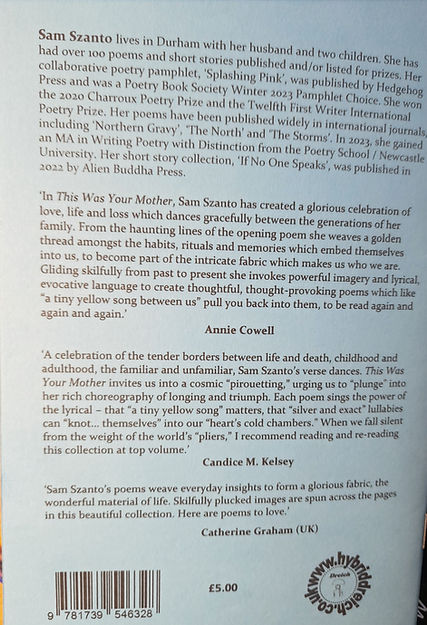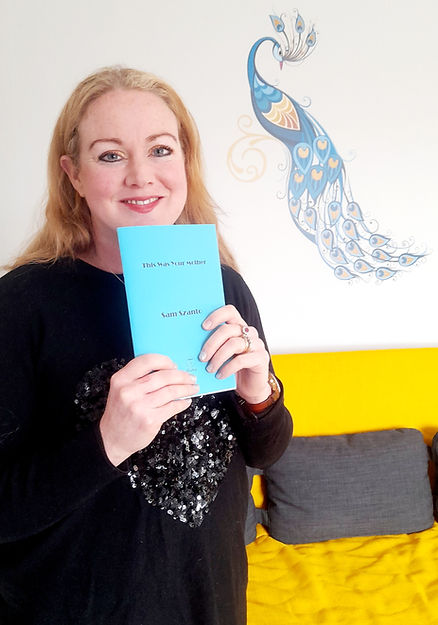20 Questions with... Donny Winter
- samszanto2
- Dec 6, 2022
- 6 min read
Updated: Jan 19, 2023

Donny Winter is an LGBTQ+ poet, educator, and activist residing in Midland, Michigan. He currently teaches Creative Writing at Delta College. His two full-length collection of poems, Carbon Footprint (2020) and Feats of Alchemy (2021) were published by Alien Buddha Press. Winter is a four-time Pushcart Prize nominee and a Best of the Net nominee. His work appears in numerous literary journals, magazines, and blogs including: Sonder Midwest, Awakened Voices, CultureCult, and Lothlorien Poetry Journal. To read more of his Winter’s work, visit his website: donnywinter.com or subscribe to his poetry YouTube channel, DonnySpeaks.
Donny Winter’s work can be found on Amazon and at Leopard Print Books online store.
Twitter: @DonnyWinter, Instagram: @DonnyWinter, Facebook: @DonnyWinterOfficial,
TikTok: @DonnyWinterOfficial
Please introduce yourself. Where are you from? What was your life like growing up?
My name is Donny Winter, and I’m an LGBTQ+ poet. I currently reside in Midland, Michigan, USA – however, I grew up in West Branch, MI, which is about 45 miles north. Life growing up was a mixture of wonder (thriving in nature) and peril, after hitting puberty and eventually coming out as a gay man. Of course, living in rural America, coming out LGBTQ+ is often met with a variety of challenges.
Did you always want to be a writer? If you also work, what do you do / did you do?
Yes, I’ve always wanted to be a writer. I began writing Godzilla fan fiction as a pre-teen. Eventually, I fell in love with poetry. Ultimately, I’d say that I’ve followed and achieved my career dreams: becoming an English professor and published author. Career-wise, my primary goal is to help others find their voices and help them develop the confidence to put their work out in the world.
Tell us about your most recently published work in a sentence.
My recent chapbook of poems, Casting Seeds, celebrates the way my paternal grandmother was a safe harbour for me growing up – instilling in me a love of gardening, a knowledge of the natural world, and a sense of self.

What are you working on right now?
Right now, I’m mostly marketing for Casting Seeds; however, I am looking ahead to my third, full-length collection. Also, a musical collaboration with the musician, brotherwell, is in the works. I’m very excited about both!
Do you have a writing routine, and if so what is it?
I do! I turn on some soft lighting, play some Enya in the background, pour myself a cup of lady grey tea, and simply start writing. I’m at my most creative late at night, so, I often find myself lingering into the wee hours of the morning penning poems.
Where do you write – always in the same space, or different places? Can you write ‘on the move’?
I’m one of those people who loves to write in the same space – that being mostly my office/library. However, since I’m a poet who weaves in a lot of nature themes, I often enjoy finding spots at parks to write or on my family’s 200 acres of forest. I do have a favorite tree to write beneath – it’s a 150-year-old white pine directly behind my parents’ house.
What advice do you have for other authors who are starting out? What is the best advice you’ve heard?
My best advice for authors is to not give up. As writers, we often have so many variables working against us ranging from time dedicated to the artform, to people in our lives telling us we 'won’t make money'. Once you can get beyond those naysayers, writing is absolute catharsis. Also, don’t be discouraged if you don’t get immediate response to your writing. What many often don’t share is that developing a successful writing career takes so much more than just the actual writing: you must be a savvy marketer and a fearless advocate of your own work. Now, the best advice I’ve received from a mentor was that our writing is an extension of who we are – our histories, experiences, and thoughts. We honor ourselves by putting pen to paper.
Do you enjoy doing live readings or are they a necessary evil – or somewhere in between?
I absolutely love live readings – I still get nervous to this day; however, it feels wholesome being able to connect with an audience.

Are there recurring themes in your work? Where do you feel these emanate from if so?
Yes. I would say that each of my books, Carbon Footprint, Feats of Alchemy, and Casting Seeds all have their own unique themes – but there’s a root which connects them all as well. I’d argue the most abundant theme present in my work is re-forging oneself after trauma. For my first and current collection, I use a lot of nature imagery to convey that. In Feats of Alchemy, I illustrate that through cybernetic imagery. Another theme present in a lot of my work is the interconnectedness between our bodies, minds, and this planet on which we live. We all share the air, soil, and water – thus, we’re symbiotic. This is largely present in my first collection, Carbon Footprint. Lastly, from an LGBTQ+ lens, another theme present is survivor alchemy. As LGBTQ+ people, we have an alchemy inside ourselves which protects us, allows us to code-switch, and ultimately, demonstrates our adaptability despite (or in result of) the trauma we experience.
Should writers have a moral purpose? What is the purpose of a writer in today’s society?
I hesitate to say that writers should have a moral purpose because my idea of what 'moral purpose' means may differ significantly from another person’s. I think that all writing has some sort of moral purpose considering it shares stories and histories with the sole purpose of connecting. However, some writers may not want the pressure of thinking that their work should be measured against a moral purpose. Some writers may write for the escape. Granted, one could also argue that showing audiences how to escape through poems or stories could have moral purpose too. Ultimately, I’d say it’s very fluid.
Do you write between genres or not?
All the time. I’d say that my second collection, Feats of Alchemy, focuses in on blending genres. It’s cyberpunk, sci-fi, LGBTQ+, and nature poetry – all woven into one book. Experimentation is fun!
Which living writers do you most admire?
Some living writers I most admire are: Meg Day, Susan Slaviero, Mary Lambert, Tess Gallagher, Amanda Gormon, Deborah Miranda, Robert Fanning, Rose Gubele, Kathryn Nuernberger, and Jenny Molberg. The last four are mentors of mine – so, they always make the list!
Which dead writers do you most admire?
Oh, so many: Emily Dickinson, Maya Angelou, Edgar Allen Poe, Sylvia Plath, Walt Whitman, JRR Tolkien, Siegfried Sassoon, Seamus Heaney, Tada Chimako, and Theodore Roethke.
What’s the book you wish you’d written?
Oh, that’s a tough one. Cyborgia by Susan Slaviero – it’s phenomenal. Open House by Theodore Roethke or Death of a Naturalist by Seamus Heaney. I’d say these three books are cornerstones for me.
What other external influences do you have: nature/place, music etc?
I’m very much influenced by nature, which is probably obvious in most of my work. I absolutely love trees – anything plant-related that grows. I’m also fascinated by death and life cycles – decay. It’s kind of morbid, I know. I’m inspired by my grandma’s house. I’m inspired by a lot of music ranging from the artist Enya to the band Evanescence. Another significant influence is the expansive history of the LGBTQ+ community.
Do you suffer from ‘writer’s block’ and how do you overcome it if so?
I do periodically. I allow myself breaks – that’s so important. If you write a book, give yourself some downtime. I think beginning the writing process can also cause some writer’s block. Don’t pressure yourself to churn out perfect pieces at first. Rough drafts are supposed to be rough. If you need to puzzle-piece a poem together, do so!
What’s been your favourite reaction to your writing?
I have two favorite reactions. First, I’ve had LGBTQ+ readers tell me that my writing has saved their life before. This is incredibly wholesome and full-circle for me considering writing has saved my life in the past. I’m glad I can help others survive through sharing my experiences. Second, when people tell me that my writing inspires them to write, that fills me with considerable giddy. It’s so humbling and validating.
How do your family and friends feel about your writing?
I know my family and friends are proud of what I’ve accomplished. My partner, especially, has been incredibly supportive. In fact, he’s inspired quite a few poems in each of my books.
Do you have a favourite bookshop?
Leopard Print Books – a pop-up bookstore here in Michigan! They’re wonderful.
How do you see the future of writing? Will we become more or less dependent on Amazon?
That’s an interesting question. I think the future of writing rests in small presses and self-publishing, honestly. There are so many tools out there for writers to use. Unfortunately, many of us must depend on Amazon because there are so few competitors for this industrial giant. I think in the future, we’ll see more competition emerge.










Comments